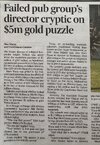wayneL
VIVA LA LIBERTAD, CARAJO!
- Joined
- 9 July 2004
- Posts
- 26,087
- Reactions
- 13,526
True, but these are businesses which previously just absorbed the costs.a legal requirement to do so.
True, but these are businesses which previously just absorbed the costs.a legal requirement to do so.
I get what you're saying.True, but these are businesses which previously just absorbed the costs.
@JohnDe Perhaps a bright future for these enterprising tykes.A group of 4 or 5 kids aged about 9 and 10 set up a little business in the front yard across the road.
They got together and made a bunch of fridge magnets, letters of the alphabet, flowers, birds, and put up a sign $2.
As neighbours and walkers came past, they would call out "want to buy a gift?" My wife spent $10, and later on, my daughters partner another $10.
Not only did the kids make some pocket money, but they also produced items that people wanted, and they had discussions with people on the street instead of being stuck in front of the TV or a game console.
I wonder how this entrepreneurial exercise would have eventuated with a cashless society.
Years ago , my mum gave me two dollars and sent me to the shop. I returned with 6 eggs, a pint of milk , some carrots, apples and a bunch of bananas.I wonder how this entrepreneurial exercise would have eventuated with a cashless society.
@Dona Ferentes And the $2 finished where??Years ago , my mum gave me two dollars and sent me to the shop. I returned with 6 eggs, a pint of milk , some carrots, apples and a bunch of bananas.
Can't do that these days. Too many security cameras
so the internet will be reliable by then ( and you won't keep upgrading the networks with new tech and data-loads )
Speaking at a parliamentary grilling in Canberra RBA governor Michele Bullock says cash won’t be around much longer.
“At the moment, we’re trying to solve the short-term issue, to make sure the cash is available … that people can use it, that people can access it,” she said.
“But we’ve got to think that cash is going to be around probably for another 10 years, and we’ve got to find a way of moving to a new system that means that distribution of cash can be undertaken and viable.”
Perhaps when these so called monetary gurus start to move into the real world of everyday folk then perhaps they can be taken seriously.so the internet will be reliable by then ( and you won't keep upgrading the networks with new tech and data-loads )
pig's a*se you will it will be a cluster-clown show .. you can't even predict inflation OR the weather
less than ten miles from the farm is a black spot .. ONLY SOS calls for part of it and then NO mobile signal AND the farm is less than 100 miles from Amberley air base less than 20 miles from a major inland city , and 3 miles from a major trucking routePerhaps when these so called monetary gurus start to move into the real world of everyday folk then perhaps they can be taken seriously.
One cyber attack will change that clowns mind.so the internet will be reliable by then ( and you won't keep upgrading the networks with new tech and data-loads )
pig's a*se you will it will be a cluster-clown show .. you can't even predict inflation OR the weather

no cards for me !When you buy anything with a credit card
- always ask if there is a surcharge if paying with a card
- if there is, ask to be given other account options over a credit account
- choose chq account as this has no charges
- always carry enough cash $aud to cover a purchase in case they take the nazi route
Next time you are in your bank get them to put the "chq acct" option on your card if it is not already there.
gg
Hello and welcome to Aussie Stock Forums!
To gain full access you must register. Registration is free and takes only a few seconds to complete.
Already a member? Log in here.